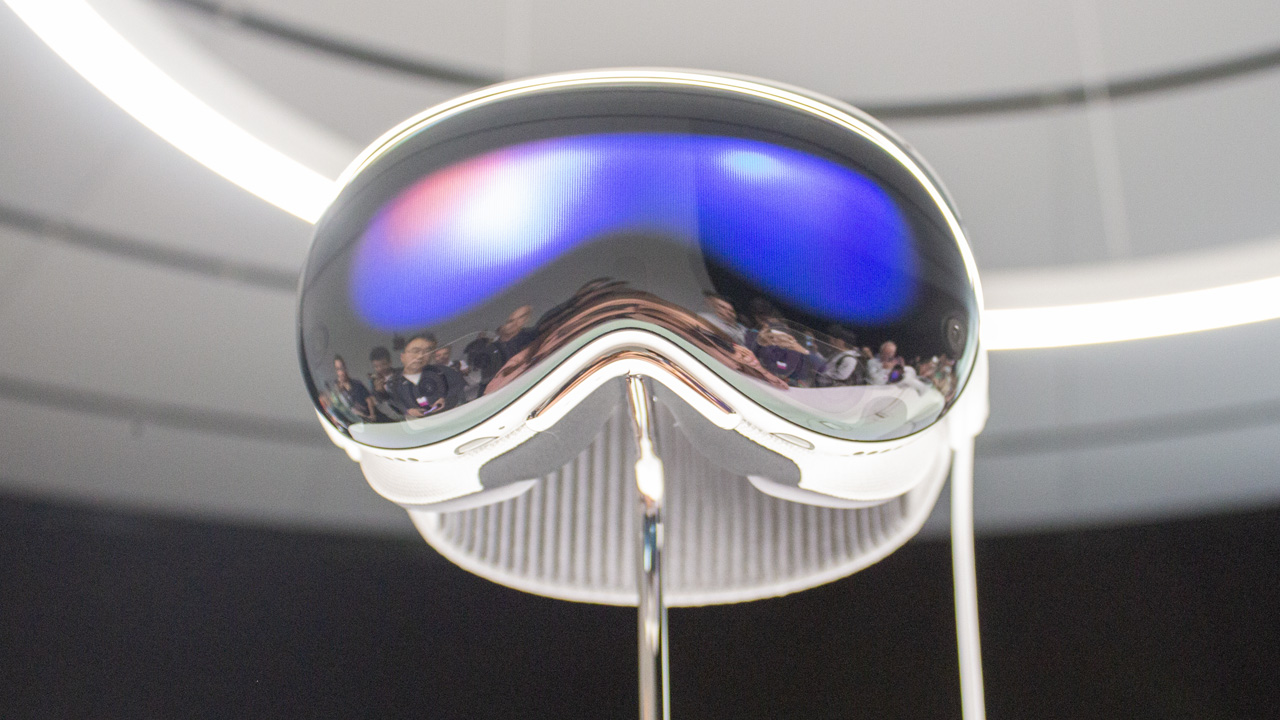Apple doesn't want developers to refer to Vision Pro apps as VR or AR... despite using the same language itself
ARKit anyone?

iMore offers spot-on advice and guidance from our team of experts, with decades of Apple device experience to lean on. Learn more with iMore!
You are now subscribed
Your newsletter sign-up was successful
With Apple’s Vision Pro coming out on February 2, developers have also been given notice that they can submit apps for the headset’s App Store — but have been advised to avoid using certain terms and phrases when describing them.
When you scroll to the ‘Describing your App’ section on the Submit your Apps page, Apple strongly recommends using the following naming conventions: “Refer to your app as a spatial computing app. Don’t describe your app experience as augmented reality (AR), virtual reality (VR), extended reality (XR), or mixed reality (MR).”
It feels like a strange approach for a headset from Apple that uses a mix of virtual and augmented reality experiences to not want to use the terms in its app descriptions — but it goes further than that. If you watch this video from WWDC 2022, Apple showcases what you can do with augmented reality. The company has freely used these terms in the past, but now it expects developers to do the complete opposite. Talk about do as I say, not as I do.
Now, Apple isn’t saying that you can’t include the terms in the name of an app that includes. If I was to call my new app ‘Daryl’s AR Adventure’ that would appear to be fine. Instead, it suggests refraining from describing any experience that has AR, VR, XR, or MR — so I couldn’t then go on to say ‘Daryl’s AR Adventure is an AR adventure’. It doesn’t make sense — this stance could bring unnecessary confusion to Vision Pro users, and to some degree, its developers. Worse still, it also goes against what the company has been describing with its own apps and services in the past.
Remember Clips?
Apple has a dedicated page on Augmented Reality, where it showcases a film on how developers can use a feature called ARKit for their apps. The best thing about this page, however, is the apps that it lists as having AR features, such as its own Clips app.
For those unfamiliar, Clips is a free app from Apple, released back in 2017, that lets you add effects like animated stickers, emoji, and AR effects to videos and images. It’s very similar to the social media app Snapchat, but it’s not seen an update since October 2022.
On this Augmented Reality page, Apple touts an AR feature in Clips. “AR Spaces enhance your real‑world environment with playful, immersive effects. Using LiDAR to sense depth, AR Spaces let you set off explosions of confetti, create a virtual dance floor in your room, or leave a trail of stars in your wake.”
iMore offers spot-on advice and guidance from our team of experts, with decades of Apple device experience to lean on. Learn more with iMore!
Other apps such as Moon Shot AR, Museum Alive, and Apple’s AR Quick Look, each is described and demoed as having AR features — all of which would be a great way to showcase what Vision Pro is capable of.
All of this gives me the impression that we’ve passed the point of no return where we can refer to certain apps and games as ‘spatial computing’. A bunch of these are VR apps. Another bunch are AR apps. It’s that simple – so why on earth does Apple not want its apps from third-party developers described as such?
Apple wants ‘spatial computing’ to be the main term for explaining VR, AR, XR, and MR all in one — it wants to own the space with a term it's coined for itself, and build customer recognition around it's own branding to devalue the efforts of others in the space. But it’s too late for that. It can’t dictate what the term should be when the headset category has companies like Meta been selling VR headsets for close to a decade.
Apple, run with it

Take VR games for example. Apple’s competitors such as Valve and Meta have long been offering VR games on competing headsets, such as Half-Life Alyx and Resident Evil VR. Now, I can see a time when Resident Evil Village, released at the end of 2023 for Macs, iPads, and iPhones, sees a release on Vision Pro, but with its VR mode too.
Is developer Capcom going to be forbidden from referring to Resident Evil on Vision Pro as a ‘VR experience’? Even if it turned out to be fundamentally the same as you'd find on, say, Sony's PlayStation VR headset? I’d be stunned if they were, because that’s exactly what the mode is!
Apple wants ‘spatial computing’ to be the main term for explaining VR, AR, XR, and MR all in one — but it’s too late for that.
For new customers who will be browsing the Vision Pro App Store, one of the first search terms will most likely be a favorite app they remember, followed by ‘AR’ or ‘VR’ to get a specific experience.
The abbreviated terms also, simply, sound better. Saying ‘Jetpack Joyride: AR’ instead of ‘Jetpack Joyride: Spatial’ makes more sense, and you know the type of game you’ll be getting before you’ve even played one level. Who knows what Spatial means yet, anyway?
So I hope that this rule changes soon — because users want simplicity and transparency in what they’ll be getting when they download a bunch of apps to their Vision Pros. It’s a new market where Apple has a great chance of being the leader once again, as it already is in the smartphone and fitness watch markets. So, Apple, let’s not see Vision Pro off to a bad start with developers by requiring them to refer to all apps as ‘spatial’ — give them the freedom to name and refer to them in any AR, VR or other form as they wish to.
More from iMore

Daryl is iMore's Features Editor, overseeing long-form and in-depth articles and op-eds. Daryl loves using his experience as both a journalist and Apple fan to tell stories about Apple's products and its community, from the apps we use every day to the products that have been long forgotten in the Cupertino archives.
Previously Software & Downloads Writer at TechRadar, and Deputy Editor at StealthOptional, he's also written a book, 'The Making of Tomb Raider', which tells the story of the beginnings of Lara Croft and the series' early development. His second book, '50 Years of Boss Fights', came out in June 2024, and has a monthly newsletter called 'Springboard'. He's also written for many other publications including WIRED, MacFormat, Bloody Disgusting, VGC, GamesRadar, Nintendo Life, VRV Blog, The Loop Magazine, SUPER JUMP, Gizmodo, Film Stories, TopTenReviews, Miketendo64, and Daily Star.
